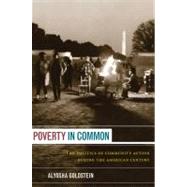Poverty in Common : The Politics of Community Action During the American Century
, by Goldstein, Alyosha- ISBN: 9780822351818 | 0822351811
- Cover: Paperback
- Copyright: 3/23/2012
In post-World War II America, the idea that local community action was indispensible for the alleviation of poverty was broadly embraced by policymakers, social scientists, international development specialists, and grassroots activists. Governmental efforts to mobilize community action in the name of democracy served as a volatile condition of possibility through which poor people and dispossessed groups negotiated the tension between calls for self-help and demands for self-determination in the context of the Cold War and global decolonization. Poverty in Common suggests new ways to think about the relationship between liberalism, government, and inequality with implications for popular debates over the "end of welfare" and neoliberalism in the U.S. Drawing on oral histories, program records, community newspapers, policy documents, and records of public hearings, Alyosha Goldstein analyzes a compelling but often overlooked series of historical episodes: Progressive era reform as a precursor to community development during the Cold War; how the language of "underdevelopment" articulated ideas about poverty and foreignness; the use of poverty as a crucible of interest group politics; and how radical groups critically reframed the question of community action in anticolonial terms. He shows how approaches to poverty were linked to the racialized and gendered negotiation of boundaries-between foreign and domestic, empire and nation, violence and order, dependency and autonomy-in the mid-twentieth century United States.







